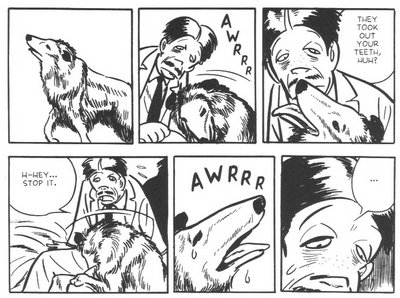Tuesday, February 20, 2007
The Universal Appeal of Alienation and Humiliation
 Abandon the Old in Tokyo
Abandon the Old in Tokyo
By: Yoshihiro Tatsumi
Length: 224 pages
Price: $19.95
Publisher: Drawn & Quarterly
The Bottom Line: If you're looking for the antithesis of the stereotypical cheery, upbeat shonen manga, this is the book for you.
The Details: Seriously, this book — the second in a three-volume series collecting Yoshihiro Tatsumi's underground manga short stories — is one of the most downbeat and depressing things I can remember reading. I'd read Tatsumi's previous work in The Push Man and Other Stories, so I was familiar with his focus on the alienating effects of modern society, but this volume comes across as even bleaker than the first. (After reading the book my first associative thought was of The Onion's frequent reliance on the idea of life as meaningless and soul-crushing for a punchline.)
There are no happy endings in the eight stories collected here. Most stories involve humiliation, mutilation, or death to varying degrees. Still, the works are definitely worth reading for the level of craft involved. Tatsumi does a great job of quickly drawing the reader in and creating sympathy for otherwise unsympathetic protagonists. Tatsumi has been referred to as "the grandfather of Japanese alternative comics," which brought to mind the common (if perhaps overly broad) criticism of American alternative comics as featuring whiny, self-indulgent characters. Although the characters in Tatsumi's stories are often pathetic, they're not annoyingly self-pitying. Partly this is because Tatsumi's characters are too silent and stoic to speak at all, much less waste breath on complaining. But another reason is because Tatsumi is so successful in portraying the oppressive conditions that drive his characters to the depths of their desperation. Each story reads like a case study in how loneliness and alienation can work to erode an individual's self-confidence and self-worth.
In the introduction, author Koji Suzuki (of The Ring fame) expresses surprise that Tatsumi's stories — which he sees as so tied to a specific period in Japan's development — are finding audiences in other, modern cultures, but it's really not so surprising. Tatsumi's tales are universal in their examination of the various ways in which the unhappiness and misfortune of the human condition can manifest itself.
Plus, where else can you see a washed-up Lassie performing oral sex on a decrepit Japanese businessman?
 Abandon the Old in Tokyo
Abandon the Old in TokyoBy: Yoshihiro Tatsumi
Length: 224 pages
Price: $19.95
Publisher: Drawn & Quarterly
The Bottom Line: If you're looking for the antithesis of the stereotypical cheery, upbeat shonen manga, this is the book for you.
The Details: Seriously, this book — the second in a three-volume series collecting Yoshihiro Tatsumi's underground manga short stories — is one of the most downbeat and depressing things I can remember reading. I'd read Tatsumi's previous work in The Push Man and Other Stories, so I was familiar with his focus on the alienating effects of modern society, but this volume comes across as even bleaker than the first. (After reading the book my first associative thought was of The Onion's frequent reliance on the idea of life as meaningless and soul-crushing for a punchline.)
There are no happy endings in the eight stories collected here. Most stories involve humiliation, mutilation, or death to varying degrees. Still, the works are definitely worth reading for the level of craft involved. Tatsumi does a great job of quickly drawing the reader in and creating sympathy for otherwise unsympathetic protagonists. Tatsumi has been referred to as "the grandfather of Japanese alternative comics," which brought to mind the common (if perhaps overly broad) criticism of American alternative comics as featuring whiny, self-indulgent characters. Although the characters in Tatsumi's stories are often pathetic, they're not annoyingly self-pitying. Partly this is because Tatsumi's characters are too silent and stoic to speak at all, much less waste breath on complaining. But another reason is because Tatsumi is so successful in portraying the oppressive conditions that drive his characters to the depths of their desperation. Each story reads like a case study in how loneliness and alienation can work to erode an individual's self-confidence and self-worth.
In the introduction, author Koji Suzuki (of The Ring fame) expresses surprise that Tatsumi's stories — which he sees as so tied to a specific period in Japan's development — are finding audiences in other, modern cultures, but it's really not so surprising. Tatsumi's tales are universal in their examination of the various ways in which the unhappiness and misfortune of the human condition can manifest itself.
Plus, where else can you see a washed-up Lassie performing oral sex on a decrepit Japanese businessman?

